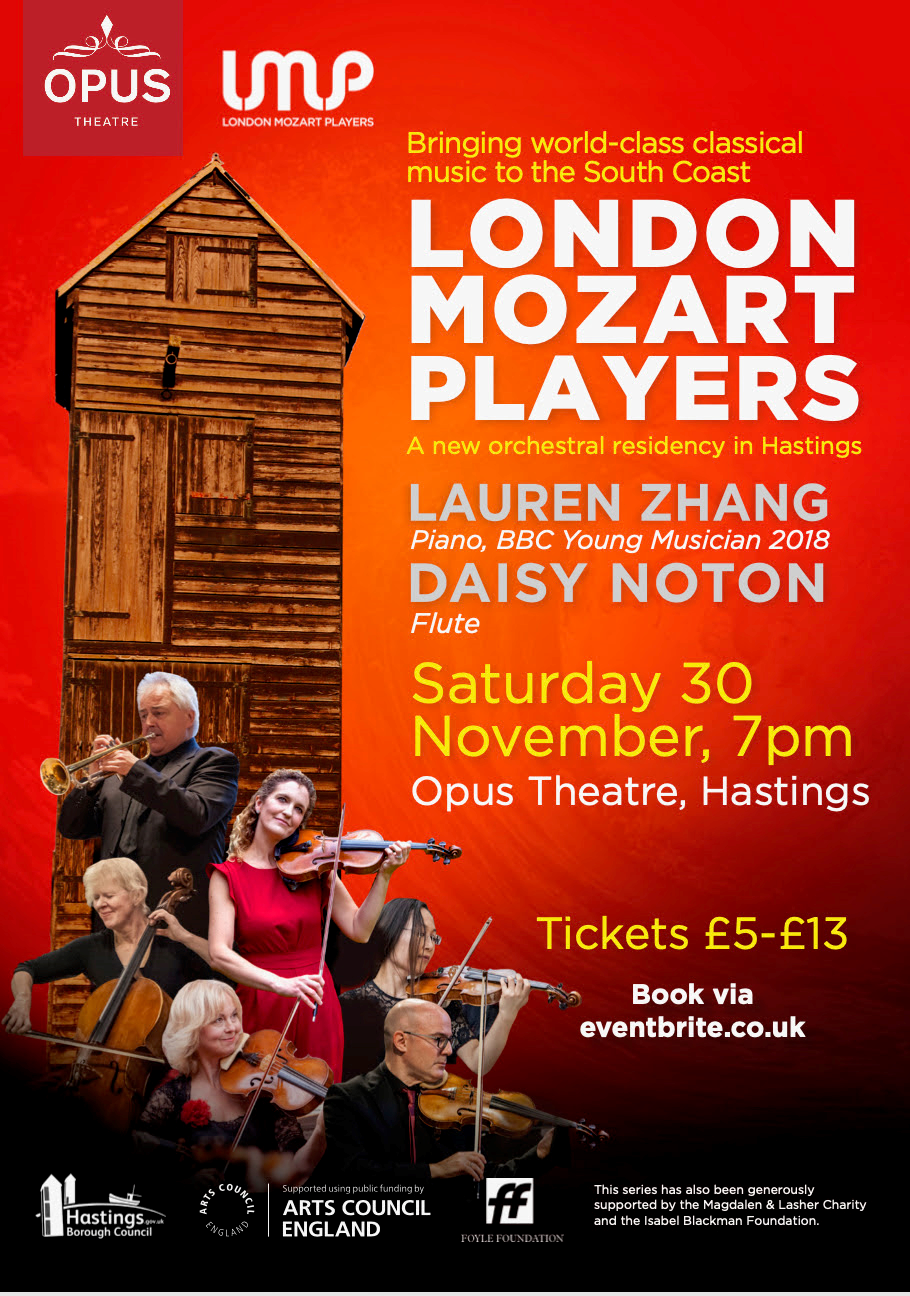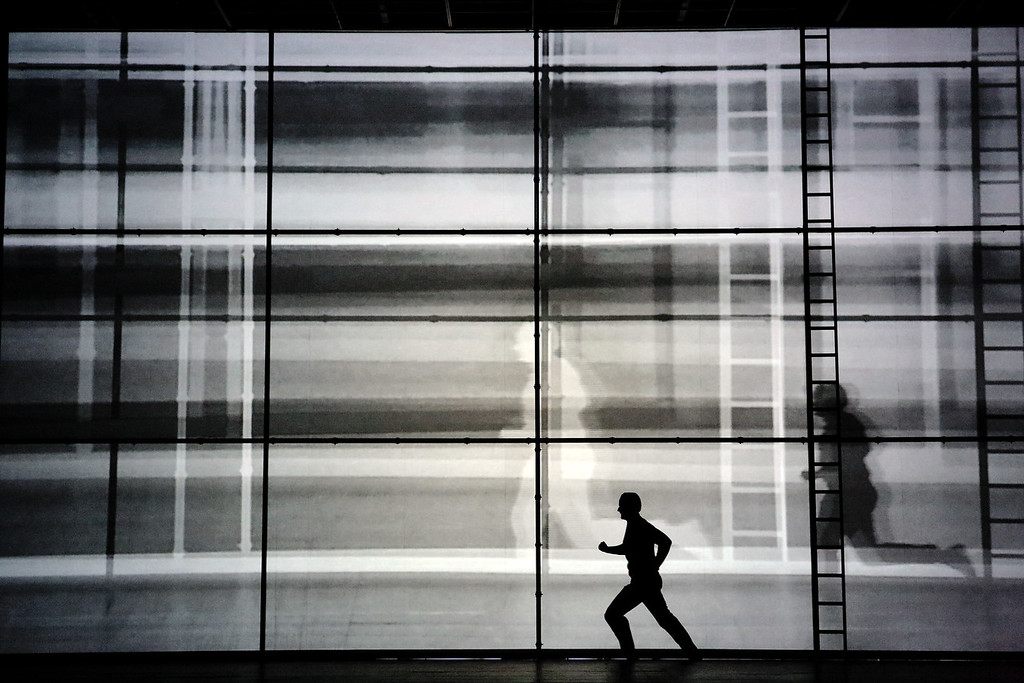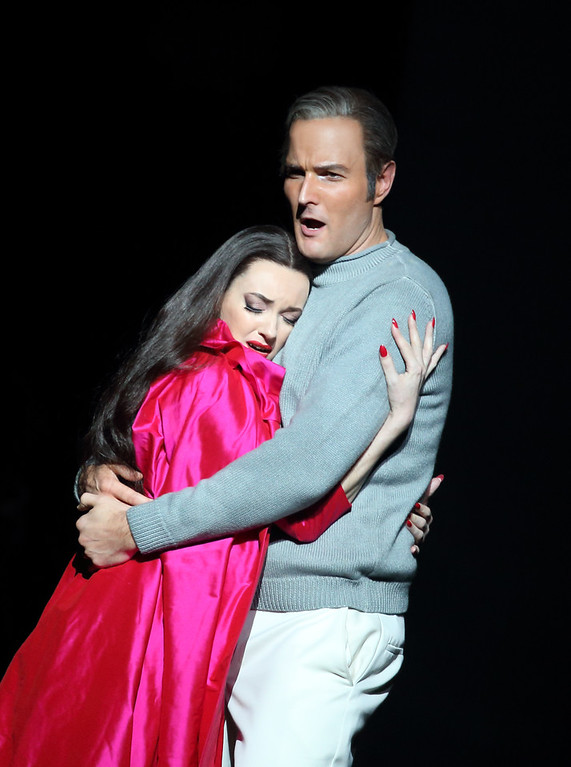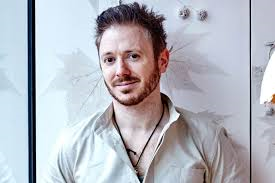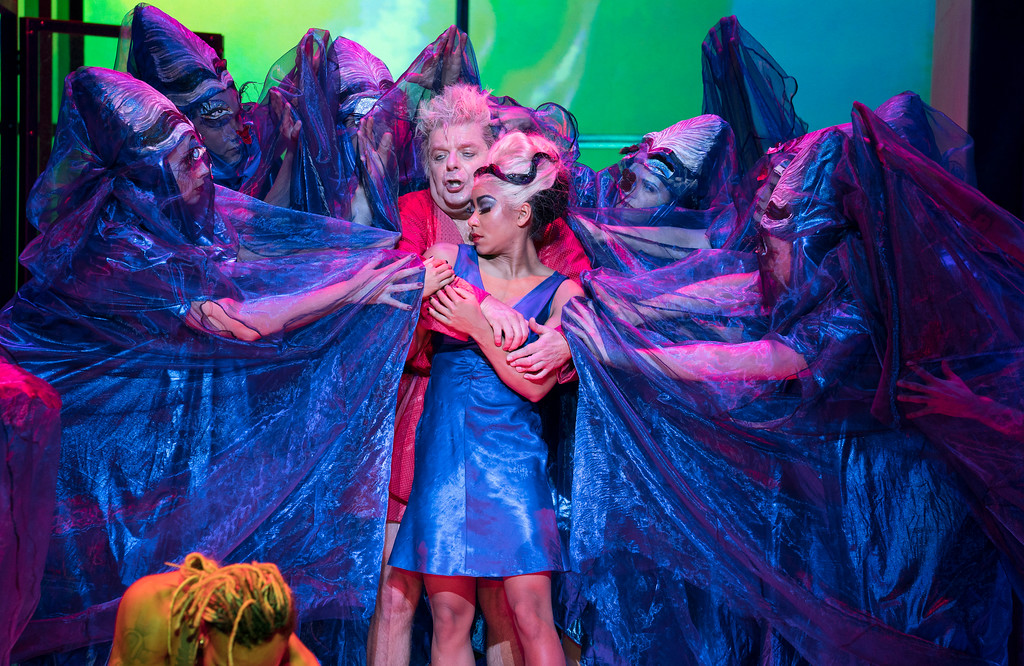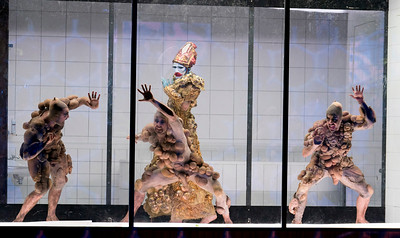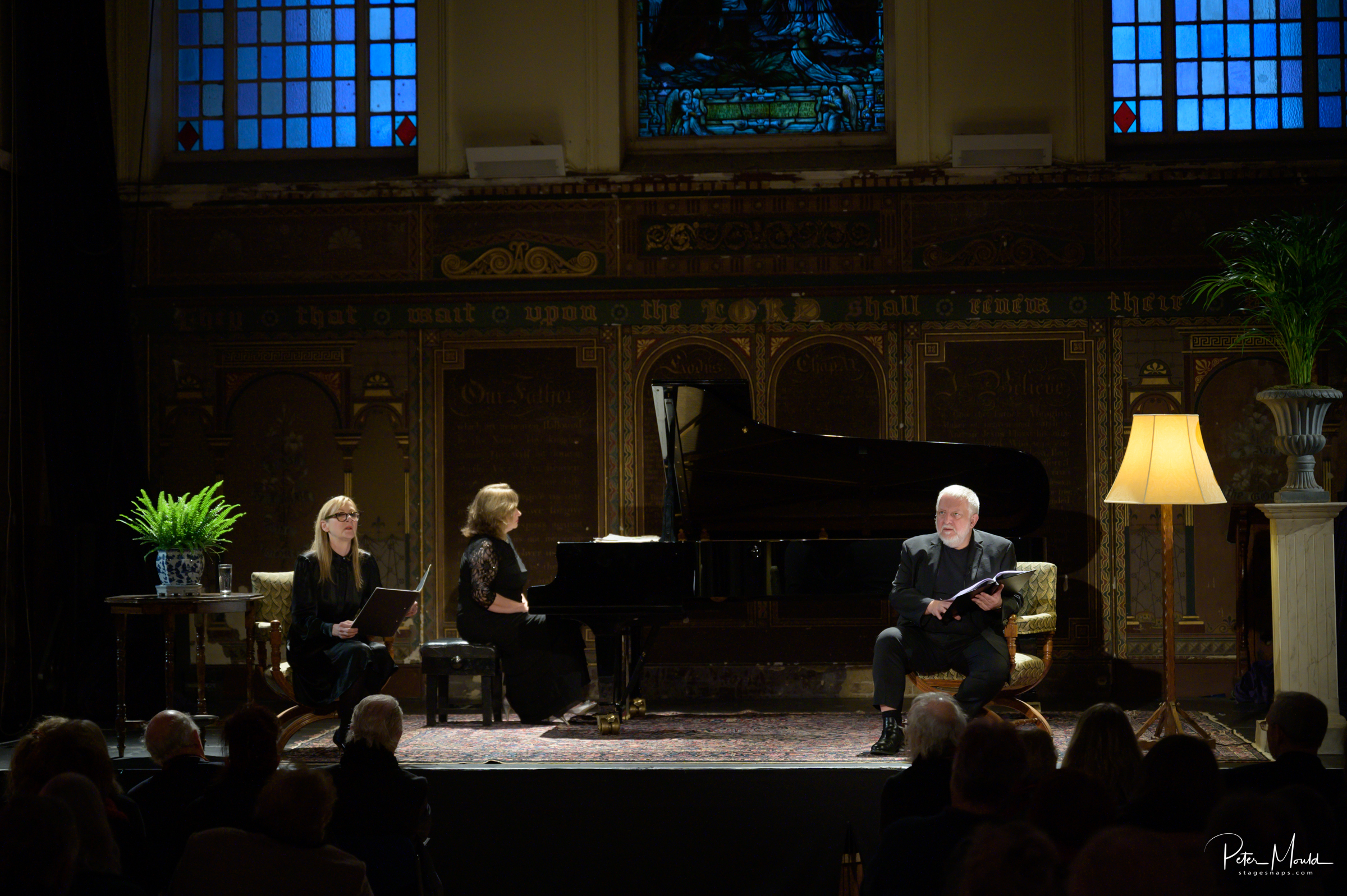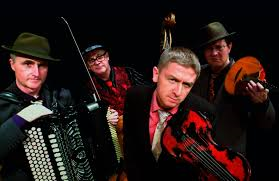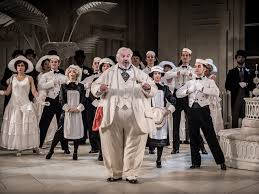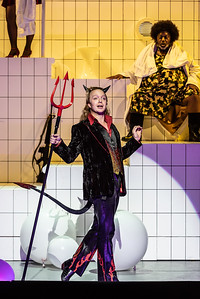Author Archives: Admin
ENO: Orphee
London Coliseum, 15 November 2019
Saving the best till last? It certainly felt like it on the first night of Orphee with a buzz of excitement which I don’t recall for any of the other evenings – even allowing for Swarovski! ENO have had great success with Philip Glass productions and justifiably so given the quality of the teams involved and the enthusiastic audiences. That Orphee joins that elite group is almost certain given not only the enthusiasm of the reception last night but the quality of the work itself. Though Netia Jones’ production works on a very different scale with a concentration on intimate relationships rather than vast effects, the narrative unfolds within a void of huge constantly moving slabs and projections which reflect mental states rather than actual places. At the same time virtually every scene is in motion as furniture moves discreetly across the stage as scenes unfold. It is disquieting and rightly so as many of the characters are dead yet indistinguishable from the living.
Philip Glass bases his opera very closely on Jean Cocteau’s film though the nearest we get to Cocteau himself is on a TV screen before it starts. From then on it is Glass’ realisation of the action which overrides memories of Cocteau, with the score itself providing underpinning emotional support. This is unexpectedly true in the second half where the music is often highly lyrical and romantic. There is almost a love duet for Orphee and the Princess, with a real warmth within the minimalist line.
Jennifer France is outstanding as the Princess. On almost the whole time, her strength of personality as well as her passionate singing, galvanise the whole evening. She is splendidly supported by Nicholas Lester as Orphee and Nicky Spence as Heurtebise. Sarah Tynan has a more difficult role as Eurydice as it is clear Orphee is so self-orientated he has little time for her – or anyone else. She comes across with sensitivity but the pink designs make it all too clear she is little more than the token wife as far as Orphee’s self-importance is concerned.
Lizzie Clachan’s designs for all four Orpheus productions have proved impressive and here are admirably slotted into the video design by Netia Jones.
Geoffrey Paterson conducts with easy grace always allowing the singers to communicate.
Of the four Orpheus works we have seen, this is the one I suspect which will last the longest.
CDs/DVDs November 2019 (2)
Verdi: La Traviata
Royal Opera House, Antonello Manacorda
OPUS ARTE OA12920
A most unusual recording if only because Richard Eyre’s production in Bob Crowley’s richly evocative sets is as naturalistic as one might wish for. At a time when director’s concepts and imposed ideas are still very much in fashion it is refreshing to find a presentation unafraid to set the story in its original time frame and allow the characters to develop in line with the narrative and score.
The singers not only work closely as an ensemble but are outstanding, if slightly unusual, in their own right. Charles Castronovo is a dark voiced Alfredo, though the top of the voice is certainly secure and passionate. By contrast Placido Domingo’s Giorgio Germont allows his tenor heritage to shine through in the lighter and higher lying passages. It is unusual and utterly convincing. Ermonela Jaho is a strong minded Violetta in the opening scenes but fades as she goes to, providing a very moving death scene.
Orchestra and chorus are excellent and the quality of the recording in faultless.
Tchaikovsky: Eugene Onegin
Bolshoi Opera, Alexander Vedernikov
BELAIR BAC246
Dmitri Tcherniakov’s production may be unusual but it is remarkably effective. Essentially every scene is set around a large dining table – middle class at the start and distinctly aristocratic by the end. Where most approaches feature the three very different dances, here we have three very different meals, with Onegin himself the outsider at each. He is warmly welcomed at the first two but cold-shouldered with the Gremins. Mariusz Kwiecien’s Onegin is a vulnerable individual, uncomfortable within close family settings yet equally out of place with the aristocracy. Tatiana Monogarova’s Tatiana on the other hand is aloof when at home but the life and soul of the party once married to Gremin. Lensky’s death is an accident rather than a brutal duel and occurs more because of the callousness of those at the party than any real animosity with Onegin.
It is all very effective and wonderfully well sung with Anatolij Kotscherga outstanding as Prince Gremin. A splendid addition even given the competition.
Shostakovich: Symphony No10
Bavarian Radio Symphony Orchestra, Mariss Jansons
BR KLASSIK 900185
A dark brooding recording of a dark work. The sense of tension which comes from a live performance is very much in evidence and the individual playing is excellent if often subdued by the scoring. Not an easy work but one which I return to more often than I might once have expected.
Handel Uncaged: Cantatas for Alto
Lawrence Zazzo, counter-tenor, continuo
INVENTA INV 1002
I wish I could be more enthusiastic about this recording. The voice is fine, the small continuo group plays convincingly but for all that I admire Handel these are not among his greatest works. Two are here given world premiere recordings and it is difficult not to jump to conclusions as to why this might be. The notes refer to Handel’s daring experiments in composition but I suspect you might need to be a Baroque expert to sense these.
Johann Joachim Quantz: Flute Concertos
Greg Dikmans, flute; Elysium Ensemble
RESONUS RES 10252
Resonus has an uncanny knack of finding composers unknown to the majority of listeners – even those of us who love Baroque music. Here is another of them. J J Quantz was born in 1697 and worked at the courts in Dresden and Berlin, having a close relationship with Frederick the Great who was of course a fine flute player himself. Quantz set a standard of flute playing and his books on music theory far outlived him even if his work is little known today. The three full concerti recorded here are an admirable introduction to his work and the care of original instrument performances brings us some way to understanding his professionalism and innovation.
Tchaikovsky: The Nutcracker
Arranged for brass ensemble with Derek Jacobi, narrator
Septura
NAXOS 8.574157
One has to assume this is aimed at the Christmas market. The arrangement if delightful and works extremely well for brass ensemble. However – unless you have a very skilful technical set-up – each short piece of music is preceded by narration from Derek Jacobi. This is fine the first time through but I doubt it will last more than a few hearings, at which point one might prefer to hear just the score. Maybe the music will be reissued later together with other brass arrangements. It would be a pity to lose them.
Beethoven: Piano Trios
George Malcolm Piano Trio
FHR FHR96
One of the real joys of the recorded music industry is that tracks which were laid down half a century ago can pop up just as fresh and bright as the day they were recorded. This is certainly true of these two piano trios recorded in 1976 and as delightful today as they were back in the 1970s. many thanks to First Hand Records for making them available again.
Garsington Opera announce partnership with Ollie Dabbous
Next summer, Garsington Opera and their caterers, Feasts, launch a new partnership with Ollie Dabbous, chef patron of Michelin-starred London restaurant, Hide.
Ollie is one of the UK’s most accomplished chefs, creating product-driven dishes that respect the integrity of the ingredients and highlight their best qualities. He honed his skills with many of the world’s top chefs, including two years with Raymond Blanc at Le Manoir aux Quat-Saison, a position at the legendary Mugaritz in Spain and the opening of Texture with Agnar Sverrisson. He opened his first restaurant, Dabbous, in 2012 to unprecedented critical acclaim and was quickly awarded a Michelin star. Ollie has since been involved in many of the top restaurant experiences in the country.
Nicola Creed, Executive Director of Garsington Opera said:
“We are thrilled to announce that Ollie Dabbous is our new menu consultant for our 2020 Season. We have been working with him to develop a selection of dishes which we are sure will tempt and excite our audience. Ollie has gained a reputation as a culinary genius who transforms simple ingredients into unbelievably delicious dishes.
We are constantly striving to combine an exceptional experience with a sense of fun both on and off the stage and Ollie brings another dimension with his unique style and well-deserved reputation. In collaboration with the Feasts team, we look forward to welcoming customers with our usual warmth and enthusiasm.”
Ollie Dabbous said:
“For Garsington Opera, we want to celebrate the British summer and offer a menu that is both accessible and innovative. The setting is very special, so it’s a privilege to be part of proceedings and hopefully adding to the guests’ enjoyment. I genuinely enjoy opera so hopefully I can see a performance as well one evening!”
ENO: The Mask of Orpheus
London Coliseum, 13 November 2019
Harrison Birtwistle has never been an easy composer but equally has always been worth making the effort to engage with the complexities he creates. There can few works more complex than The Mask of Orpheus which not only has multiple versions of the same character but refuses to provide simple dialogue, so that one is frequently involved in simply going along with the production rather than trying to work out at any one moment what is actually happening. In this light Daniel Kramer’s production was either magnificent or counter-productive, and for my part I tend to think this is the finest work he has done for the company. Rather than trying to smooth out the complexities he allows them to pile up on themselves to the point of confusion, both for those of us watching and for the characters we are watching.
With three Orpheus, three Eurydice and three Aristaeus, who inter-act with each other as well as their own obvious partners, there is a continuing dichotomy for the audience, working out who to pay attention to or who to regard as the more important at any one time. As such it is uncomfortably lifelike. The frustrations of day-to-day living are here given a mystical level but one we can empathise with even given the excessively heightened presentation.
On one level the narrative is naturalistically set, within a large 1970s/80s apartment, but as soon as the glass tank drifts in with the mime artists, and the grandiose costuming of the mythical characters we are aware this is anything but natural.
Nothing is explained and by the end we are none the wiser, unless it is having experienced the story cathartically, which is surely more than enough.
Musically this is finest thing we have heard so far this season with the orchestra on exceptional form for all the demands of the score, under its two conductors – Martyn Brabbins and James Henshaw effectively working back to back. The integration of electronic music with the live musicians is finely balanced and the links are invisible. The large cast are drawn from strength with Peter Hoare a moving Orpheus the Man. The choreography by Barnaby Booth is always closely related to the dramatic needs of the scene rather than being dance for its own sake. The video design is apt and never intrusive.
Though realistically the production is unlikely to be revived it is a pity because it was certainly well attended and ENO should be mounting more works like this rather than yet another – dare I say – Carmen.
CDs/DVDs November 2019 (1)
MASAAKI SUZUKI PLAYS BACH ORGAN WORKS VOL 3
Masaaki Suzuki, Silbermann organ of Freiburg Cathedral
BIS BIS-2421 79’07
The latest volume of Bach’s organ works played by Masaaki Suzuki sees a fine recording on an historic organ with which the composer would have felt very much at home. The programme includes the Prelude & Fugue in C major and in C minor as well as the extended treatments of the chorales Allein Gott in der Hoh sei Her and Ach was sol lich Sunder Machen. The CD ends with the longest work, Passacaglia & Fugue in C minor.
JON LEIFS – EDDA II : THE LIVES OF THE GODS
Hanna Dora Sturludottir, mezzo-soprano, Elmar Gilbertsson, tenor
Kristin Sigmundsson, bass, Schola cantorum
Iceland Symphony Orchestra
Hermann Baumer, conductor
BIS BIS-2420 65’10
This truly is epic music! The second part of the (unfinished) trilogy based on medieval Icelandic literature, this oratorio in 6 parts includes sections on Odin and the Valkyries. This work occupied much of the composer’s life and it is good to see it presented here in a fine, well resourced performance. A comprehensive booklet gives some useful background, full texts and translations.
HAYDN – ORGAN CONCERTOS
Iain Quinn, organ
Sophie Gent, violin
Arcangelo, director Jonathan Cohen
CHANDOS CHAN 20118 69’41
Arguably less well known, but no less interesting than Handel’s, these works for organ and orchestra are amongst Haydn’s earliest concertos. In this new recording made in St Mary’s Church, South Woodford these pieces are recreated with care and attention to detail. Concertos 1,2 & 6 can be found here. In addition it is stated that Concerto No 10 is available for download only. Still being dedicated to CD format I don’t know how or why!
IVAN ILIC PLAYS HAYDN SYMPHONIES TRANSCRIBED BY CARL DAVID STEGMANN
Ivan Ilic, piano
CHANDOS CHAN 20142 68’42
This is an unusual release – recordings of three Haydn Symphonies in transcriptions made close to the time of their composition. Whilst there are different opinions about the place and value of transcriptions this is a good insight into the nineteenth century practice of transcribing works for orchestra so that they could be widely disseminated and experienced by audiences who would otherwise be denied access to new music. In these recordings we are in good hands as Ivan Ilic brings this music to us on the piano once more.
HOWARD SKEMPTON – MAN & BAT; PIANO CONCERTO;
THE MOON IS FLASHING; ETERNITY’S SUNRISE
Roderick Williams, baritone, James Gilchrist, tenor, Tim Horton, piano
Ensemble 360
FHR FHR90 70’25
Howard Skempton continues to compose music that is fresh and exciting. Here we have his Piano Concerto (version for piano & string quartet) alongside another piece for instrumental ensemble, Eternity’s Sunrise. These works are complemented by two extended pieces for voice and instruments – a setting of DH Lawrence’s Man and Bat (2017), together with The Moon is Flashing, drawing on texts from the composer, Chris Newman and more DH Lawrence.
THE SECRET LIFE OF CAROLS – 800 YEARS OF CHRISTMAS MUSIC
The Telling
FHR FHR94 51’17
This four part ensemble produces a haunting sound, harking back to medieval times, with the combination of female voices, harps and drum. This production reposits a more resolutely folk approach to the singing of carols, enthused with vitality and rhythm.
FANTASY
Tessa Lark, violin, Amy Yang, piano
FHR FHR86 66’42
The basis for this recording are three 18th Century Fantasies by Telemann. Other works, from varying periods, but using the same or similar name are added to the mix. The longest work, Schubert’s Fantasie in C major, sits alongside works by Kreisler and Ravel as well as Tessa Lark’s own Appalachian Fantasy. A good balanced programme.
MACHAUT – THE SINGLE ROSE
The Orlando Consort
HYPERION CDA68277 56’48
This programme of secular vocal music from the pen of 14th Century French composer Guillame de Machaut transports the listener to a very specific sound world. Pristine performances are given by the four male members of The Orlando Consort.
DOHNANYI – PIANO QUINTETS; STRING QUARTET NO. 2
Takacs Quartet
Marc-Andre Hamelin,piano
HYPERION CDA68238 81’00
This CD would make a very good introduction to the music of Erno Dohnanyi. This neglected Hungarian composer is beginning to receive more recognition and this release can only help in that regard.
COBBETT’S LEGACY – THE NEW COBBETT PRIZE FOR CHAMBER MUSIC
Berkeley Ensemble
RESONUS RES10243 50’44
This is a very interesting release for those wishing to discover new music. Together with the winner of the original Cobbett prize for chamber music the three winning pieces from the newly inaugurated “New Cobbett Prize for Chamber Music”. Composers are William Hursltone, Barnaby Martin, Samuel Wesley Lewis & Lawrence Osborn. A bonus is the inclusion of A Purcell Garland – arrangements by Oliver Knussen, George Benjamin and Colin Matthews.
LA GRACIEUSE – PIECES DE VIOLE BY MARIN MARAIS
Robert Smith, viola da gamba, Israel Golani, baroque guitar & theorbo
Joshua Cheatham, viola da gamba, Olivier Fortin, harpsichord
RESONUS RES10244 66’13
Four suites from Marais’ five volumes of characterful Pieces de viole are presented here by this specially formed group of instrumentalists which includes the Amsterdam-based viola da gamba player, Robert Smith
THE WAITING SKY – MUSIC FOR ADVENT & CHRISTMAS
SANSARA
RESONUS RES10250 62’25
This beautifully performed and recorded disc blends mostly contemporary vocal works with music from the 15th & 16th Centuries. Despite so many seasonal offerings each year there is surely room for this.
AMADIO FREDDI – VESPERS (1616)
The Gonzaga Band, director Jamie Savan
RESONUS RES10245 58’10
This second recording from The Gonzaga Band on Resonus includes premiere recordings of the various movements of this contemporary of Monteverdi’s. Interwoven are pieces by other composers of the period including Giovanni and Andrea Gabrieli.
O GEMMA CLARISSIMA – MUSIC IN PRAISE OF ST CATHARINE
The Choirs of St Catharine’s College, Cambridge, Director Edward Wickham
RESONUS RES10246 72’02
A beautiful collection of 15th & 16th Century motets and hymns in praise of St Catharine presented by the choirs of the Cambridge College that bears her name.
LEOPOLD HOFMANN – FLUTE CONCERTOS 3
Uwe Grodd, flute
Czech Chamber Philharmonic Orchestra Pardubice, conductor Michael Halasz
NAXOS 8.573967 62’55
Volume 3 of this series of the 18th Century Vienese composer’s flute concertos consists of four works – in D & A and two in G.
GEORGE PHILIPP TELEMANN – 12 FANTASIES FOR SOLO FLUTE
Giovanni Roselli, flute
NAXOS 8.579054 55’27
Here for a change we are treated to a programme for solo flute, allowing the instrument to speak for itself in this original and contrasting music.
MILITARY BEETHOVEN – COMPOSITIONS & TRANSCRIPTIONS FOR PIANO
Carl Petersson, piano
NAXOS 8.573928 72’43
An intriguing and entertaining disc. Music includes Wellington’s Victory (or The Battle of Vitoria), 7 Variations on God Save the King & 5 Variations on Rule Britannia as well as the extended Music for a Ballet of the Knights.
MESSIAEN – MEDITATIONS SUR LE MYSTERE DE LA SAINTE TRINITE
Tom Winpenny, organ of Hallgrimskirkja, Reykjavik, Iceland
NAXOS 8.573979 74’30
Tom Winpenny continues to explore the twentieth century organ repertoire and proves he is very much at home with this music, Messiaen’s moving theological cycle exploring the Holy Trinity. A fresh recording on this very suitable Icelandic instrument.
SYNAGOGUE ORGAN MUSIC
Stephan Lutermann, organ of St Maria & Cacilia, Verden
Cantor Assaf Levitin, Bass
CPO CPO 555127-2 73’34
This is a very welcome recording of 19th & 20th Century organ music for the synagogue based on traditional Jewish themes. The vocal music which provides the basis of these works is also included courtesy of the Cantor. A disappointment is the fact that this is not recorded on a synagogue organ. Perhaps there could be a project to record such organs for a future release?
SATIE – COMPLETE PIANO WORKS 4
Nicolas Horvath, piano
GRAND PIANO GP823 61’59
Volume 4 of this series presents a very interesting selection of pieces embracing different styles including music for theatre, pantomime, ragtime and more reflective styles. Very enjoyable.
SP
Heitor Villa-Lobos: Guitar concerto & Harmonica Concerto
Sao Paulo Symphony Orchestra, Giancarlo Guerrero
NAXOS 8.574018
Not as familiar as they might be, this forms an interesting collection as it includes the Sexteto Mistico and the Quinteto Instrumental in addition to the two concerti. Though popular at the time of its writing the guitar concerto is rarely played today and the appealing harmonic concerto entirely absent. This is a pity as both works have much to commend them and it would be good to feel that programme organisers moved outside of their comfort zone at times.
Philip Glass: Glassworlds 6: America
Nicolas Horvath, piano
GRAND PIANO GP817
The arrangement for solo piano of the second piano concerto works very well and sits comfortably alongside the world premiere recordings of Three pieces from Appomattox and A secret solo 2 which is a charming early work. I was not entirely convinced by Wichita Vortex Sutra with its mumbled narrative. I was unclear whether I was actually supposed to hear the text or not. Apart from this, the cd is a strong addition to the series.
Schumann; Violin concerto
Brahms: Double concerto
Antje Weithaas, violin; Maximilian Hornung, cello,
NDR Radiophilharmonie, Andrew Manze
CPO 555 172-2
The Schumann violin concerto is a surprising rarity on the concert platform and its complex construction may give some indication of why this is. Unlike the very familiar Sibelius, Mendelssohn, Bruch etc the soloist often seems lost within the denser orchestration and the melodic lines and more dissipated. Well worth getting to know but something of a challenge. No such problem with the Brahms which is here lovingly played with warm enthusiasm throughout and an indulgent slow movement second to know. Worth obtaining for both items.
Beethoven: Symphonies 3 & 1
Arranged for flute and piano trio
Uwe Grodd, flute; Gould Piano Trio
NAXOS 8.574039
With the Beethoven anniversary coming up next year we are bound to get some unusual recordings and this may be something of a precursor. Hummel’s arrangements are particularly striking in both their faithfulness to the originals and yet the sense that they could have been written like this in the first place. The Eroica is particularly impressive given the expectation of orchestral colour and dynamic one has come to expect, yet the limited palette seems to work extremely well. Thoroughly enjoyable and hopefully we might get the rest of the series!
Beloved Clara
St Mary in the Castle, 10 November 2019
Clara Wieck was one of the most important composers and pianists of the nineteenth century but for years her genius was concealed beneath the assumptions about the place of women in music within the early romantic period. Beloved Clara draws on original letters and diaries, from those most intimately involved with the Schumann’s, to tease out the complex triangular relationship between Clara and Robert Schumann and their close friend Johannes Brahms. That Clara worshipped her husband is not in doubt, it shines through her letters and her refusal of offers of marriage once Robert had died. At the same time Robert – even if we can overlook the dreadful impact of his mental illness – regarded Clara both as a woman and his wife, as essentially a support to him and at times objected to her having a professional life of her own even when then needed the money.
All this is couched and supported by short piano works which go a long way to help us understand the complexity and intimacy of the unfolding story. Early works by Schumann, easily linked to Mendelssohn who knew both of them in their early years, gave way to more demanding works by the young Brahms, and it is his works which dominated the second half.
That the evening draws to a close with Liszt’s glorious arrangement of Schumann’s Widmung was moving and entirely fitting.
In a comfortably domestic setting Lesley Sharp and Simon Russell Beale bring not only the Schumann’s to life but Brahms and other members of the close family. Their ability to create warmth and intimacy was constantly moving, and the complexity of emotional response throughout was far more engaging than any simple retelling of a love story.
To give us time to digest and meditate on the letters and diary extracts Lucy Parham played fifteen short pieces, carefully chosen to reflect the narrative rather than simply fill in the gaps and these proved to be highly apt throughout.
The afternoon was a fund-raising – and awareness-raising – event for the development of the HIPCC as it takes its programme forward to develop educational outreach for young people in the 1066 area, and a new range of events in spring 2020. The afternoon was very well supported – rightly so given the quality of the performers – and bodes very well for the programme next year.
Brighton Philharmonic Orchestra
Christian Garrick and Friends with Brighton Phiharmonic Strings
10 November
The high spot of this concert was the Budapest Café Orchestra Selected Medley when Christian Garrick, David Gordon, Richard Pryce, Tom Hooper, Eddie Hession and Adrian Zolotuhin played without the BPO strings who sat in rapt admiration. With lovely folksy panache they weren’t, at times, a million miles from the vibrant ceilidh band my dad used to lead. Rapport and exuberance, lots of shouts of “hey” with accelerandi to ridiculous tempi made it tremendous fun. The presto sections were interspersed with schmultzy slow bits and witty musical “chats” between players and all played without notation exactly as my father always insisted dance music must be.
The rest of the concert consisted of a number of other pieces of different lengths, two composed by Garrick himself. Astor Piazzolla’s Four Seasons of Brighton Aires, which dates from the late 1960s in various forms is almost a concerto grosso. Garrick began by playing close to the bridge to create a scratchy sound and I admired his rhythmic harmonics. The Invierno movement is particularly listenable although it owes a lot to Pachelbel’s Canon and I couldn’t help wondering whether Andrew Lloyd Webber lifted one of the Jesus Christ Superstar themes from here. The piece also, played enthusiastically here, references Vivaldi.
John Dankworth’s Violin Concerto, written for Garrick has been performed only once before so perhaps I can be forgiven for never having heard of it. The most interesting thing about it is the way it uses amplified violin (Garrick also uses an acoustic instrument and a fully electric one in this concert) and provides plenty of scope for some fine virtuoso playing. Its components are a bit disparate however. There are some quite interesting passages but they don’t seem to flow one from another.
This concert was a new departure for BPO – presumably an experimental attempt to entice new audience members. Those who were there seemed thrilled with the programme but, sadly, the Dome was barely half full.
Susan Elkin
ENO: The Mikado
London Coliseum, 9 November 2019
For a production that has been around since the mid-1980s Jonathan Miller’s Mikado is vibrant, fresh and fun. Elaine Tyler-Hall has clearly made an accomplished job of reviving it.
So what distinguishes it? The traditional trappings have gone and we’re in a 1930s hotel although the material is so strong it really doesn’t matter where you set it. It’s a visual feast of black and white and it is a feat of directorial genius to have a troop of twelve dancers in addition to the singing chorus because it enables all sorts of sparky choreography with the tap dancing in both finales being a real tour de force.
Interestingly though, Gilbert’s libretto is almost intact with only very minor adjustments such as the substitution of a “slow suburban” train for the now meaningless parliamentary one. In general it’s still as funny as it ever was and it’s good to see that respected. It’s also pleasing to hear people, who presumably aren’t particularly familiar with the piece, laughing not just at performers doing clever things but at Gilbert’s wit.
Richard Suart is back in harness writing a new “Little List” for every performance and of course it’s a show stopper. He knows how to squeeze every ounce of humour from every nuanced word of the rest of his part too and looks suitably absurd with that floppy back wig centrally parted. John Tomlinson looks suitably tyrannical in a colonial white suit and Panama hat, his enormous stature dwarfing everyone on stage. His gravelly bass voice is just the job too.
There are no weak links among the principals – this is ENO after all – but I think it’s the quality of the choral singing which really makes this production stand out. Every note of the harmony is gloriously incisive and resonant.
It’s also a joy to hear Sullivan played by such a large and competent pit band (Conductor: Chris Hopkins) which brings out the musical jokes as well as playing the whole score beautifully. I was also delighted to be allowed to listen to the overture properly too, without the visual trappings most directors seem to clutter it up with too.
As a production, the performance I saw was hugely enjoyable but not flawless. Because Richard Suart has to read his List – or at least consult his notes – presumably because he hasn’t had time to learn it, he and the orchestra were seriously out of sync. There were timing problems in The Mikado’s song too and in one or two other places. These are very minor gripes though. It’s a magnificent show.
Susan Elkin
ENO: Offenbach Orpheus in the Underworld.
London Coliseum, 8 November 2019
There will many of us who can still remember the Sadlers Wells Orpheus with Eric Shilling as Jupiter. It is not just an old man’s memory to say it still lives on in its froth and vitality – the very facets this new ENO staging seems to lack. Only Alex Otterburn’s wonderfully effusive Pluto comes anywhere near the enthusiasm and level of communication the work needs if it is to succeed. This is not to say it is poorly sung. Much of the musical side is fine with Mary Bevan a beautiful Eurydice and Alan Oke splendid in the small but essential role of John Styx. But Emma Rice’s staging tries too hard and seems to consistently miss the mark. The vast 1930s swimming pool set in the first half inhibits movement, reducing singers to constantly climbing up and down stairs, while the chorus mooch about in a straight line across the front. Any sense of character development or relationship is only primitively sketched in. The newly adapted text is often quite witty, particularly in the hands of Alex Otterburn, but the approach fails to hang together to create of pleasing whole.
Stalwarts of the quality of Willard White, Anne-Marie Owens and Judith Howarth are wasted when they are given so little to do, or what they do do seems inappropriate. Unusually, Sian Edwards conducting seemed often on the pedestrian side where it could have been uplifting. It was not simply the tempi, which were fine, but a lack of dynamism.
Now midway through the Orpheus cycle we have had one dubious and one disappointment. Let us hope the Birtwhistle and Glass can make up for it.

